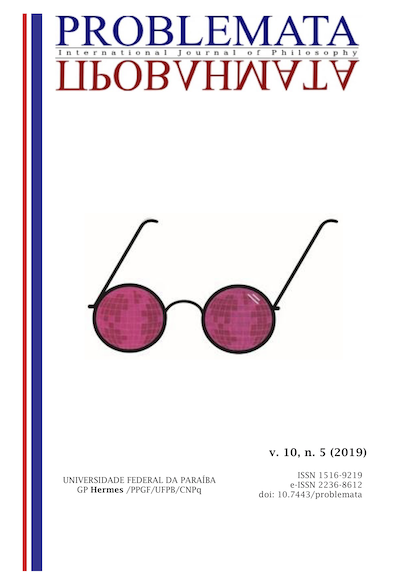THE HERMENEUTIC FUNCTION OF "DISTANCING" IN PAUL RICOEUR
DOI:
https://doi.org/10.7443/problemata.v10i5.45542Keywords:
Hermeneutics, Discourse, Distance, SignificationAbstract
The subsequent article presents a cutout in the issue of the condition of possibility of communication in Paul Ricoeur, namely, it happens in and through the distance. For these purpose, will be dedicated a moment to understand this character of the discourse as a realization - passing through the question of the happening of the discourse and it's significance. And will make a pause in regard of the importance of the composition of a discourse while significant - which results in the question that the discourse is objectified in a work - it turns into a object just in a paradoxical and participatory moment in which the reader suffers a injunction to mean it in the face of what himself is able to project as he is stimulated by the author.
Downloads
References
RICOEUR, Paul. Do texto à acção. Porto: Res.
______. Temps et Récit I: L’intrigue et le récit historique. Paris: Seuil, 1983.
______. Tempo e narrativa: Tomo III. Trad. Roberto Leal Ferreira. Campinas: Papirus, 1997.
______. Écrits et conférences 2: Herméneutique. Paris: Éditions du Seuil, 2010.
______. O discurso da ação. Lisboa: Ed. 70, 2013.
Downloads
Published
Issue
Section
License
Authors who publish with this journal agree to the following terms:
- Authors retain copyright and grant the journal right of first publication with the work simultaneously licensed under a Creative Commons Attribution License that allows others to share the work with an acknowledgement of the work's authorship and initial publication in this journal.
- Authors are able to enter into separate, additional contractual arrangements for the non-exclusive distribution of the journal's published version of the work (e.g., post it to an institutional repository or publish it in a book), with an acknowledgement of its initial publication in this journal.
-
- Authors are permitted and encouraged to post their work online (e.g., in institutional repositories or on their website) prior to and during the submission process, as it can lead to productive exchanges, as well as earlier and greater citation of published work (See The Effect of Open Access).





